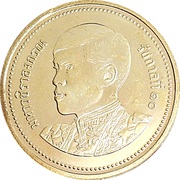Thailand | |
| Value | 2 Thai baht |
|---|---|
| Mass | 4 g |
| Diameter | 21.75 mm |
| Edge | Segmented (Plain and Reeded edges) |
| Composition | Aluminium bronze 92% Cu, 6% Al, 2% Ni |
| Years of minting | 2005–present |
| Catalog number | 52011 |
| Obverse | |
 | |
| Design | H.M. King Maha Vajiralongkorn |
| Designer | Designed by Mr Vudhichai Seangern. Sculpted by Mr Tummanoon Geawsawang. |
| Design date | 2018 |
| Reverse | |
 | |
| Design | Royal Monogram of King Vajiralongkorn |
| Designer | Designed by Mr Chaiyod Soontrapa. Sculpted by Mr Tummanoon Geawsawang. |
| Design date | 2018 |
In Thailand, the two-baht coin is the coin which is worth 2 baht or 200 satang. The new 2-baht coin design features H.M. King Bhumibol Adulyadej, the Great on the obverse, like all other Thai legal tender coins presently in circulation. The reverse design depicts the Golden Mountain at Wat Saket Ratcha Wora Maha Wihan in Bangkok.
Before the two-baht coin entered into circulation, this denomination was used as a commemorative coin since 1979. As of 1996, there is one cupronickel and forty cupronickel-clad-copper commemorative coin series.
On September 15, 2005, the Royal Thai Mint began minting two-baht coins to complete the binary system in Thailand's coinage. That is, each successive denomination is worth twice, or roughly twice, as much as the previous one.[citation needed] Thai coin denominations in general circulation are now 25 satang, 50 satang, 1 baht, 2 baht, 5 baht, and 10 baht.
Recent statistics show that the one-baht coins constitute about 60% of the total coin circulation in the Thai economy. According to the Treasury Department, the issuance of the two-baht coins will solve the overwhelming demand for the one-baht coins as the two-baht coins now fill the gap between the one- and five-baht coins. This translates into savings in time and materials for the mint. The mint is considering expanding the use of multi-ply plated steel technology to other coin denominations due to volatile base metal prices and rising production costs.[citation needed]
On February 3, 2009, the Royal Thai Mint released the new series two-baht coin, minted in 2008, which uses aluminium bronze in place of the former nickel-clad low-carbon steel.